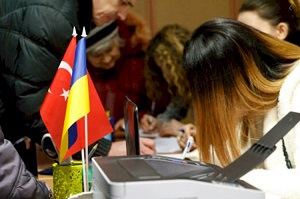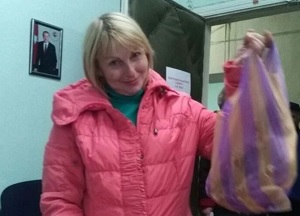Hamas Fires Rockets into Jerusalem After Clashes at Al-Aqsa Mosque; Israel Strikes Gaza
Israeli Prime Minister Benjamin Netanyahu said Hamas crossed a "red line" with the attack.

Hamas Fires Rockets into Jerusalem After Clashes at Al-Aqsa Mosque; Israel Strikes Gaza
The Islamic militant group fired the rockets minutes after a 6 p.m. deadline had passed. The group had given Israel an ultimatum to pull out its security forces from the Al-Aqsa mosque, as well as from another Jerusalem flashpoint.

The Israeli army said an initial burst of seven rockets was fired from the Gaza Strip. One of the rockets was intercepted by Israel's defense system. In total, Israeli media reports said more than 30 rockets were fired. There were no immediate reports of damage or casualties.
The rockets caused sirens to go off across Jerusalem, along with warnings over loudspeakers in Hebrew and English.
Israeli Prime Minister Benjamin Netanyahu said Hamas crossed a "red line" with the attack.
"Israel will respond very forcefully. We will not tolerate attacks on our territory, our capital, our citizens and our soldiers. Whoever strikes us will pay a heavy price," he said.
The Israeli military responded with airstrikes on Hamas targets in Gaza. The Gaza Health Ministry said nine Palestinians, including three children, died. However, it is not clear whether they were killed by the Israeli strikes or from a misfired Hamas rocket.
A spokesman for Hamas' military wing, Abu Obeida, said the rocket attack was a response to what he called Israeli "crimes and aggression" in Jerusalem.
Earlier, witnesses say Israeli security forces fired tear gas and stun grenades into the Al-Aqsa mosque, while worshippers threw stones and other projectiles at the Israeli forces. The Palestinian Red Crescent Society said more than 300 Palestinians were injured, including 228 who were taken to nearby hospitals.
U.S. Secretary of State Antony Blinken said he was "deeply concerned about the rocket attacks" on Israel and that they should stop immediately.
"All sides need to de-escalate, reduce tension, take practical steps to calm things down," he said in brief remarks ahead of a meeting with Jordanian Foreign Minister Ayman Safadi at the State Department.
Safadi said that "maintaining peace and stability in Jerusalem is key" and said the focus is to ensure that escalation stops.
White House Press Secretary Jen Psaki said Monday the United States is closely monitoring the situation in Israel and said the Biden administration has serious concerns about the escalating violence.
British Foreign Secretary Dominic Raab also condemned the rocket attacks and said, "The ongoing violence in Jerusalem and Gaza must stop. We need an immediate de-escalation on all sides."
To avoid the clashes, Israeli organizers of a march to celebrate the Jewish state's 1967 capture of east Jerusalem altered its parade route to bypass the Muslim Quarter of the Old City.
Monday's violence is the latest after weeks of mounting tensions and confrontations between Palestinians and Israeli troops in the city, sparked in part by Israeli plans to carry out evictions of Palestinian families in a neighborhood of east Jerusalem.
A lawsuit over the evictions has reached Israel's Supreme Court. However, the court postponed a key ruling in the case Monday, citing the "circumstances."
Saturday night into Sunday, dozens of Palestinians were wounded in violent confrontations with police in Jerusalem, when Muslims marked Laylat al-Qadr, or the "night of destiny," the holiest period of the Muslim fasting month of Ramadan.
The skirmishes occurred at the gates of the Al-Aqsa mosque compound in the Old City, a site known to Jews as the Temple Mount and to Muslims as the Noble Sanctuary, considered the holiest site in Judaism and the third holiest in Islam.
Israeli Prime Minister Benjamin Netanyahu said Sunday that authorities "will not allow any extremists to destabilize the calm," after several days of clashes between Palestinian protesters and Israel police outside the Old City of Jerusalem.
Palestinian President Mahmoud Abbas said last week he "held [Israel] responsible for the dangerous developments and sinful attacks taking place in the holy city" and called on the United Nations Security Council to hold an urgent session on the issue.
The U.N. Security Council held a private meeting Monday on the rising tensions. Nine of the council’s 15 members called for the session. U.N. Special Coordinator for the Middle East Peace Process Tor Wennesland briefed them on the situation.
Diplomats said council members were discussing issuing a statement, which would require consensus of all 15 members.
“Our view is that the Security Council should urgently speak out, and we hope that it will be able to do so today,” said Ireland’s U.N. Ambassador Geraldine Byrne Nason. “We need to see an immediate de-escalation and an end to violence.”
Stephane Dujarric, spokesperson for U.N. Secretary-General Antonio Guterres, said he is following developments with "deep concern," and is worried they could trigger "yet another dangerous escalation, leading to further violence and loss of lives."
The United Nations has also strongly condemned Hamas’ launching of rockets from Gaza into Israel and called on Israel to halt the evictions of Palestinians in east Jerusalem.
U.S. national security adviser Jake Sullivan spoke Sunday to his Israeli counterpart, Meir Ben-Shabbat, “to express the United States’ serious concerns about the situation in Jerusalem,” as well as concerns about the potential evictions of Palestinian families. Sullivan said the U.S. is committed to Israel’s security and to peace and stability in the Middle East, according to a White House statement.
Israel considers all of Jerusalem as its unified capital. The Palestinians want east Jerusalem to be the capital of a future state.
VOA








































